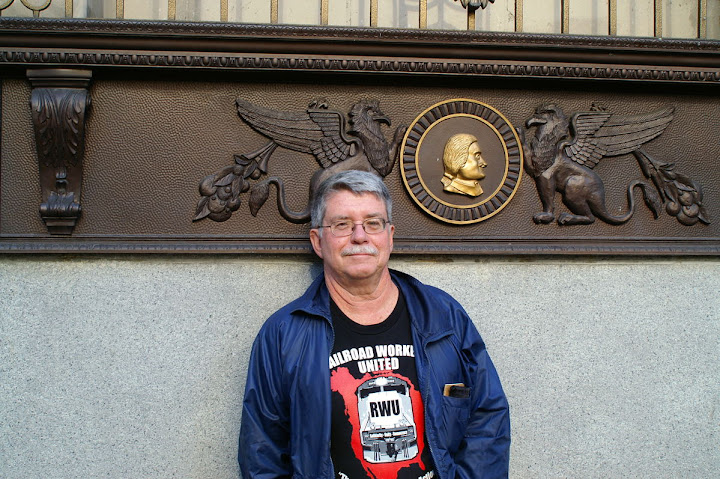It started with a Single Payer caucus at 8 in the morning where Mark Dudzic, Rose Ann DeMoro, and others brought us up to date on how they saw the day unfolding.
The two-resolution agreement was holding up. The resolutions would be discussed after the Obama speech. The general sentiment of the meeting was that this outcome marked a real milestone in the battle for Single Payer health care in the labor unions. It was nice to see Donna Smith and her husband there. Donna also made a presentation.
Post convention, support for the Weiner amendment and the Kucinich amendment was emphasized. The Troy Area Labor Council handed out a leaflet on the Weiner amendment.
As you might imagine, the security was all over the place today due to the Obama visit. We had to go through metal detectors and be frisked by security. I forgot about my small camera and cell phone clipped to my belt and had them turned on to see if they really were just that.
There was an encouraging tone to the immigrant worker discussion that took place in the morning. This perhaps was the most impassioned so far of the convention. The hostility to immigrant workers and support for raids seem now to be a fading memory for organized labor. At least on the official level.
The other PA Senator, Arlen Specter, showed up, and I used his speech as an excuse to get more coffee and have a good discussion with Jerry Tucker (UAW/retired) about the future for the health care struggle and some interesting talk about the UAW. A Reuther descendant is making a film about his forbears that Jerry is a bit involved with, and I guess the young Reuther is having trouble coming up with an ending.
Then of course came the Obama speech. Suddenly the hall was packed as he got a rapturous welcome. His speech was a stem-winding defense of his administration’s actions and policies up to now, and he found lots of sympathy from the dais and the floor, there is little doubt.
Troy Area Labor Council’s Mike Keenan Speaks on the Single Payer Resolution Photo by Jon Flanders |
After Obama left, the first order of business was resolution 34, the Single Payer resolution. Leo Gerard, President of the Steelworkers Union, presided, and all speakers from the floor supported the resolution. Mike Keenan of the TALC even got a turn climbing the stairs to talk on it. It passed unanimously.
They then passed the resolution that “supports” the administration — though the resolution’s support for the public option and hostility to taxes or fees on the health plans of the employed are likely to be in contradiction to the final product of the Senate and Congress. Gerry McEntee gave an angry attack on the Baucus group in the Senate.
|
Michael Moore Press Conference for Capitalism: A Love Story at AFL-CIO Convention |
So what can we make of this AFL-CIO convention? Held in the midst of the worst economic crisis since the Great Depression, following a serious split in the federation, which left the federation in serious economic difficulties, one can hardly envy the incoming President Trumka
Leaving all that aside, I see the following. The highest body of organized labor in the US just held a gathering that endorsed social universal health insurance, semi-officially allowed a segment of the body to attend, indeed march to, a film that condemns capitalism, and declared its solidarity with immigrant “illegal workers.”
For now, I will take that part of what happened here in Pittsburgh as a real step forward for working people, a step that can be followed by ones going on to much higher ground.
* * *
RESOLUTION 34
The Social Insurance Model for Health Care Reform
Submitted by Alameda Labor Council (Calif.), California Nurses Association/National Nurses Organizing Committee, and International Longshore and Warehouse Union
Amended by the Legislation and Policy Committee
The nation once again is focused on the crisis in health care and the American people are looking for a comprehensive solution, instead of the inaction and incredibly ineffective piecemeal approach of the last 10 years.
Nearly 47 million U.S. citizens are uninsured. Tens of millions more worry about losing the coverage they have. Workers fear changing or losing jobs because they are at risk of losing their health care coverage. American businesses that provide adequate health benefits are at a significant disadvantage, competing in the global marketplace with foreign companies that do not carry health care costs on their balance sheets. The same is true for businesses in domestic competition against employers that provide little or no coverage.
As a society, we all benefit from improvements in public health. We are a more creative, vibrant, productive and democratic nation because of it. We are all at risk of illness, injury or poor health, and we all suffer when individuals are denied needed care. The shortcomings of the American health care system — which ignores these fundamental realities — strain our nation’s social and economic fabric.
The time for talking about this crisis has passed. All families deserve the security of a universal health care system that guarantees access based on need rather than income. Health care is a fundamental human right and an important measure of social justice.
As a nation, we need to exert the political will to enact comprehensive health care reform nationwide. There is strong evidence the crisis can be solved with tools at hand and at a cost that pales in comparison to the toll in human lives the current system exacts.
It is time to mobilize America behind a concrete plan to enact universal health care, and the AFL-CIO commits its full resources to asserting leadership in this historic effort.
Universal health care does not mean mandating that everyone must buy a health insurance policy and then handing them the bills. Meaningful health care reform must be measured by the following tests:
Guaranteed Health Care for All
- Everyone should have health care that meets their needs, without exclusions or penalties.
- Universal health care is a basic human right and moral imperative for our nation that must be funded through progressive financing.
- While the market has an important role to play, our government — as the voice of all of us — must play the central role in regulating, financing and providing health care.
- Coverage should be comprehensive.
- Unions and employers should continue to retain the ability to collectively bargain supplemental coverage.
Patient Free Choice of Providers
- Individual patients should have the freedom to choose their physician, hospital or other health care providers.
Financing through Shared Responsibility
- Because everyone faces the possibility of poor health, risks should be shared broadly and everyone, including employers, should share responsibility for contributing to the system through progressive financing.
- A level playing field should be provided for all businesses. Every employer must participate in ensuring health coverage and no employer should be disadvantaged because of the age or health of its workforce or number of retirees.
Effective Cost Control
- Reform efforts must include effective mechanisms for controlling costs, requiring information on provider performance and enhancing efficiency.
- Investments should be made in systems and technology to reduce medical errors and costs, streamline administration and promote best practices.
Front-line Caregivers
- Employees who are front-line caregivers should have a protected voice in improving health care.
Do No Harm
- Until we have a comprehensive alternative for all Americans, reform efforts should not undermine existing coverage or put people at risk of unmet health care needs.
- Reform must not diminish the hard-fought benefits currently enjoyed by our members, their families and union retirees.
Our approach should be to build on what’s best in American health care. At the same time, we should draw from the best experiences of other countries that have achieved universal coverage at a fraction of U.S. health care costs.
Unlike our fragmented and flawed health care system, a successful universal health care system would provide benefits and cost savings for all stakeholders. The leadership to make comprehensive reform possible, then, must come from all quarters:
- Governments will have to forge the tough consensus that commits necessary public funding while paying only for care that is effective and efficient, based on the best science available.
- Employers must provide strong political support for a transition away from the current employment-based system and be willing to provide continuing financial contributions sufficient to responsibly contribute to the new funding requirements.
- Unions and other organizations that represent users of health services must make enactment of comprehensive health reform legislation a top priority and make a long-term commitment to improving health care service delivery.
- Health care providers and practitioners need to commit their leadership and lend their knowledge and experience to achieving necessary improvements in the quality and effectiveness of care, and use their considerable political clout to support the effort.
We will mobilize our members to build support for bold, meaningful and comprehensive reform and work to pass legislation that assures everyone comprehensive coverage.
One concrete plan that meets the test of comprehensive, universal health coverage would build on our nation’s successful universal health coverage plan for seniors: Medicare.
In its 40-year history, Medicare has delivered substantial advances for the health care of older Americans and people with disabilities. Medicare has guaranteed coverage, made health care more affordable, included a form of shared financial responsibility, significantly reduced administrative costs compared with those of private plans and has been the largely unheralded financer of America’s medical science advances. Medicare also has been a leader in advancing quality care and improvements in health care service delivery in the United States.
Such an approach would require updating and expanding Medicare benefits to fit the working population and children, as well as negotiating prices with physicians and providers that families — and the country — can afford. It would encourage innovation in health care services and medical technology. Employers’ responsibility for health care financing would be broadly and equitably shared, substantially reducing burdens on all businesses and reducing disadvantages currently faced in the global marketplace. In building on Medicare to move toward a universal program, we can find a practical, achievable and affordable solution to our country’s health care crisis.
The experience of Medicare (and of nearly every other industrialized country) shows the most cost-effective and equitable way to provide quality health care is through a single-payer system. Our nation should provide a single high standard of comprehensive care for all.
We reiterate our longstanding call for congressional leaders to unite behind such a plan. There have been a number of single-payer bills introduced in this Congress and previous Congresses, including H.R. 676 introduced by Rep. Conyers and bills introduced by Sen. Kennedy and Reps. Stark and Dingell. The single-payer approach is one the AFL-CIO supports and that merits dedicated congressional support and enactment.
Whatever the outcome of the current debate over health care reform in the 111th Congress, the task of establishing health care as a human right, not a privilege, will still lay before us. We continue to believe the social insurance model should be our goal, and we will continue to fight for reforms that take us in that direction.
 |
Jon Flanders is a member and former president of IAM LL 1145 and a member of the Troy Area Labor Council, AFL-CIO. |
